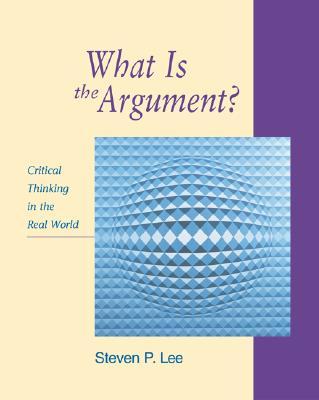
Zustellung: Mo, 28.07. - Sa, 02.08.
Versand in 3-4 Wochen
VersandkostenfreiWhat Is the Argument? Critical Thinking in the Real World is a clear, thoughtful text that solves a wide array of teaching problems unique to the critical thinking course. As the subtitle states, Lee introduces students to the kind of arguments they encounter outside the classroom, and develops a distinctive and effective set of methods by which they can identify and evaluate arguments. More than most texts, What Is the Argument presents an interesting, integrated, skill-building approach that satisfies students and teachers alike.
Inhaltsverzeichnis
<H3> 1. What Is Critical Thinking? <H4> What is Critical Thinking? / The Importance of Critical Thinking / Critical Thinking in the Real World / Chapter Summary / A Look Ahead / Key Terms<H3> 2. What Is An Argument? <H4> The Support Relationship / Argumentative Texts / Persuasion and the Social Nature of Argument / Chapter Summary / Key Terms<H3> 3. Explanations and Value Arguments <H4> Explanation / Facts, Values, and Opinions / Chapter Summary / Key Terms<H3> 4. What Is the Argument? Conclusion and Premises <H4> Argument Structure / Identifying the Conclusion / Identifying the Premises / Chapter Summary / Key Terms<H3> 5. Reformulation and Complex Arguments <H4> General Statements / Conditional Statements / The Idea of Reformulation / Complex Arguments / Chapter Summary / Key Terms<H3> 6. Evaluating Argument Form <H4> Argument Evaluation / Deductive Arguments and Validity / Implicit Premises / Nondeductive Arguments and Formal Strength / The Idea of a Fallacy / Irrelevant Reason and Hasty Conclusion / Some Specific Format Fallacies / Chapter Summary / Key Terms<H3> 7. Deductive Arguments <H4> Formal Logic and Logical Form / Categorical Logic / Immediate Inference / Testing for Validity in Categorical Logic / Statement Logic / Chapter Summary / Key Terms<H3> 8. Evaluating Argument Content <H4> Premises and their Assessment / The Fallacies of Problematic Premise and False Premise / Appeals to Authority / Some Specific Content Fallacies / Chapter Summary / Key Terms<H3> 9. Language and Meaning <H4> Concepts and Their Role in Arguments / Definition / Some Specific Fallacies of Language Use / Chapter Summary / Key Terms<H3> 10. Induction and Causal Arguments <H4> Inductive Arguments / 10.2 Evaluating Inductive Arguments / Causal Arguments / Chapter Summary / Key Terms<H3> 11. All-Things-Considered Arguments and Analogies <H4> All-Things-Considered Arguments / Arguments from Analogy / Evaluation-the Fallacy of Faulty Analogy / Summary / Key Terms
Produktdetails
Erscheinungsdatum
15. Mai 2002
Sprache
englisch
Seitenanzahl
560
Autor/Autorin
Steven P. Lee
Verlag/Hersteller
Produktart
kartoniert
Gewicht
962 g
Größe (L/B/H)
233/187/24 mm
Sonstiges
OTHER, 021
ISBN
9780072840865
Entdecken Sie mehr
Bewertungen
0 Bewertungen
Es wurden noch keine Bewertungen abgegeben. Schreiben Sie die erste Bewertung zu "What Is the Argument?: Critical Thinking in the Real World [With Access to Powerweb Card]" und helfen Sie damit anderen bei der Kaufentscheidung.







